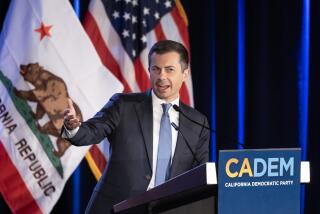Episcopalians to Choose Leader at First Convention Held in L.A. Diocese
The Episcopal Church’s highest legislative body, which opens a weeklong meeting in Anaheim today, is historic for two reasons. It is the 200th anniversary of the triennial general convention, and it is the first time the convention has met in the Diocese of Los Angeles.
In fact, for the first 100 years that American Episcopalians convened, they never met west of Baltimore. And during the last 100, the general convention has come to the West Coast only six times.
Of prime concern to the 200 bishops and 900 deputies--other clergy and lay delegates--representing the 2.8 million-member denomination at the convention will be the election of a new presiding bishop. The incumbent, John Maury Allin, 64, will retire at the end of this year after serving in the church’s top post for 12 years.
Nominations Made
For the first time, nominations for the office of presiding bishop have been made prior to a convention. Nominated are Bishops Edmond L. Browning of Hawaii, William C. Frey of Colorado, Furman C. Stough of Alabama and John T. Walker of Washington, D.C. Additional nominations may be made at a joint session of the House of Deputies and the House of Bishops at 2 p.m. Monday.
The bishops will meet in executive session the next morning for the election, but confirmation must subsequently be made by the deputies in a separate executive session tentatively set for Tuesday afternoon.
A plethora of proposed resolutions dealing with virtually every aspect of the relationship of the church and its members to society will come before the convention. One of the most hotly debated issues is expected to be the church’s stand on abortion.
Last October, the House of Bishops approved a “theological reflection” paper on abortion for the church to study. Since 1976, the general convention has taken a “restrained” position on the subject, saying in essence that abortion at times may be the “lesser of two evils.” The study paper notes that “to say that on occasion abortion is a defensible choice may be heard by some as saying, ‘It is all right.’ It is not ‘all right’; it is tragic.”
Range of Resolutions
Other proposed resolutions deal with Central America and U.S. policy, the sanctuary movement and refugees, nuclear disarmament, ecumenical relations with other denominations, ordination of gays and the remarriage of divorced persons.
Most meetings of the general convention will be held at the Anaheim Convention Center, but the women’s triennial will meet concurrently at the Anaheim Marriott.
The bicameral governing system of the church, which has been compared to the U.S. Congress, meets in the two houses. The House of Bishops is composed of all active and retired bishops of the church’s 95 U.S. dioceses and 17 dioceses overseas; the House of Deputies includes four clergy and four lay representatives from each diocese.
About 200 of the 900 deputies at the convention this year will be women--a far cry from 1946, when the first woman was elected a lay deputy. The Committee on Credentials questioned the validity of a woman being a “layman,” however, and she was seated with the understanding that this was not to be a precedent.
Ruth Jenkins, writing in Church Times, the diocesan newspaper for the Diocese of San Diego, noted that she was elected a deputy in 1949 by the Diocese of Olympia, Wash., and with two other women deputies asked to be seated.
Women Deputies Not Seated
“After a morning of heated debate, a motion not to seat us was overwhelmingly passed,” Jenkins wrote, adding that women were finally seated as regular deputies in 1970. The general convention approved the ordination of Episcopal women as priests in 1976.
Although the House of Deputies and the House of Bishops meet separately for much of the business sessions, they are required to concur in decision-making that affects budget, program and policy matters for the church for the next three years.
Opening legislative sessions will begin at 9 a.m. today, and Bishop Allin will give a report on his term in office at 11 a.m.
The opening Eucharist will be at 10 a.m. Sunday, when Anglican Archbishop of Canterbury Robert A. K. Runcie will preach. The service is expected to draw about 10,000 persons to the convention center. Representatives from the Anglican Communion throughout the world will attend.
Fire Restrictions
In order to gain permission from the Anaheim Fire Department to hold the candlelight Communion in the center, local Episcopal officials had to observe stringent rules. These included making the huge 18-foot-long altar cloth fire resistant by soaking it in a chemical solution, according to Mary Godby of Alta Loma, visual coordinator for the convention. Also, the candles to be used in the procession and at the sides of the altar have to be enclosed in glass cylinders, Godby said, “which were difficult to find.”
Other highlights of the convention, which will end next Saturday afternoon, include Los Angeles Night in the convention arena at 8 p.m. Wednesday.
Presented by the host Diocese of Los Angeles, the multicultural program will display “the diversity of the Los Angeles area as well as some of its high-tech expertise and filmland glamour,” according to a press release. Film and television actor Ned Beatty will emcee the show.
More to Read
Sign up for Essential California
The most important California stories and recommendations in your inbox every morning.
You may occasionally receive promotional content from the Los Angeles Times.










